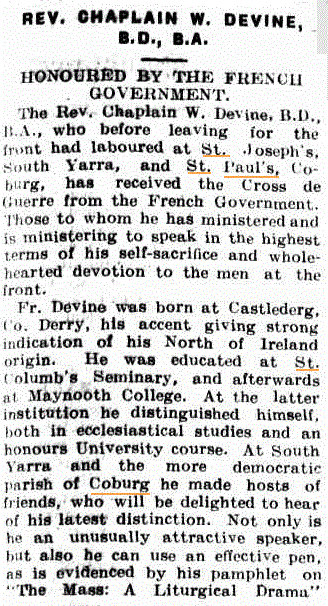4th Class Chaplain Major William Devine, Chaplains
Twenty-seven year old
Irishman William Devine enlisted as an army chaplain in July 1915. Born in
Castlederg, County Tyrone, he gained a BA and BD in Ireland and came to
Australia in 1914. He had been assistant parish priest to the elderly Fr
Matthew Hayes at St Paul’s, Coburg for twelve months at the time of his
enlistment. His older brother George (who signed as de Vine) served with the
British forces. He attested in February 1916 with the Royal Horse and Royal Field Artillery,
having previously served with the Royal Army Medical Corps for twelve months.
Usually we see parents or
siblings or other family members listed as next of kin, but as he was a Roman
Catholic priest Chaplain Devine listed his next of kin as the Dean of St
Patrick’s Cathedral, Melbourne and Archbishop Carr, Chaplain General,
recommended him as a military chaplain.
Fr Devine served with
distinction and was awarded the Military Cross and the Croix de Guerre. The Australian Dictionary of Biography records that he spent most of his time with the 48th
Battalion and that he wrote about the Battalion’s war experiences just after
the war ended.
Image courtesy AWM. Image C04450. Group
portrait of the Bishop of Amiens and a party of Australian officers. Back row,
left to right: Chaplain Reverend W. Devine MC, 12th Australian Infantry
Brigade; Lieutenant Henderson, 48th Battalion, 12th Australian Infantry
Brigade; unidentified (hidden); Lieutenant Colonel S. L. Perry DSO MC, 48th
Battalion; Brigadier General Sydney C. E. Herring DSO, 13th Australian Infantry
Brigade; unidentified (hidden). Front row: Major W. Fowler-Bunnsworth MC, 4th
Division; Major General (Maj Gen) John Gellibrand CB DSO, commanding 3rd
Australian Division; Bishop of Amiens; Maj Gen E. G. Sinclair-Maclagan,
commanding 4th Australian Division; Captain A. Nicholson, 18th Australian
Infantry Brigade; Capt C. Bartlett, 4th Division. (Donor Herring)
In
February 1919 he became seriously ill with broncho-pneumonia and was
hospitalised in London. After his return to Australia in May 1919, he organised for fourteen Victoria Cross winners to act
as Archbishop Mannix’s guard of honour in the famous 1920 St Patrick Day’s
procession.
St Patrick’s Day Procession, 1920. Australasian, 27 March 1920, p.51
You can read more about the 1920 St Patrick’s Day
Procession here.
Here are the 14 VC winners, some Catholic and some Protestant:
Image
courtesy AWM. Image P01383.018.
This is a
restored version of P01383.017. The original is is a framed composite
photograph presented to Lieutenant John Hamilton VC by his Grace the Archbishop
of Melbourne and the Irish citizens of Victoria on the occasion of the Saint
Patrick's Day celebrations in Melbourne, 17 March 1920. The composite
photograph comprises portraits of fourteen Victoria Cross winners (ten Roman
Catholics and four Protestants, all presumably with Irish backgrounds) with
portraits of his Grace Dr Daniel Mannix (the Roman Catholic Archbishop of
Melbourne) and the entrepreneur John Wren in the centre. The VC winners
comprise Private (Pte) William Currey, Sergeant (Sgt) George Howell, Corporal
(Cpl) Walter Peeler, Pte John Jackson, Lieutenant (Lt) Joseph Maxwell, Lt John
Dwyer, Sgt Maurice Buckley (he was accidentally killed the following year) Pte
George Cartwright, Cpl Thomas Axford, Cpl John Carroll, Pte Edward Ryan, Sgt
John Whittle, Lt John Hamilton, Lt Lawrence McCarthey. It was probably financed
by John Wren.
You will find more
information on the image here.
And another image showing the
14 VC winners:
Courtesy State Library of
Victoria. Image H2010.179
The State Library of
Victoria’s notes for the image read: This image shows Archbishop Daniel Mannix in a car in front of a
large house, possibly his residence Raheen. The car is surrounded by 14 VC
heroes, most on white horses and some seated beside Dr. Mannix in the car,
forming a guard of honor for Dr. Mannix, St. Patrick's Day Celebration, 17
March 1920. Victoria Cross winners (ten Roman Catholics and four Protestants,
all presumably with Irish backgrounds) comprise Private (Pte) William Currey,
Sergeant (Sgt) George Howell, Corporal (Cpl) Walter Peeler, Pte John Jackson,
Lieutenant (Lt) Joseph Maxwell, Lt John Dwyer, Sgt Maurice Buckley (he was
accidently killed the following year), Pte George Cartwright, Cpl Thomas
Axford, Cpl John Carroll, Pte Edward Ryan, Sgt John Whittle, Lt John Hamilton,
and Lt Lawrence McCarthey. A lady is seated on a white horse draped in a green
blanket with a banner titled "Old Kilmore" and a shamrock on it.
Now back to Fr Devine …
Fr Devine later returned
to Ireland but moved on to serve in China in 1927, where he stayed for three
years before returning to Ireland. He died in Dublin in 1959.
The following article from the Advocate, 12 May 1917,
gives an insight into William Devine the man, something that cannot be conveyed
in the official record.







No comments:
Post a Comment